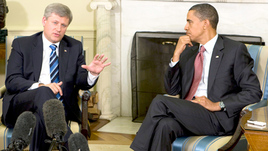
Basically, here’s the problem. Even after they have been engaged to perform by American presenters, Canadians musicians must obtain a work permit to enter the USA. And the length of time it takes for an application to be processed by US Immigration is impossible to predict.
“Sometimes it takes six to eight weeks,” says Summers, “But sometimes it can take a year. And sometimes it takes so long that the permit doesn’t arrive before the concert happens, so the Canadian artist has to be replaced. And there’s no appeal.”
The process can also be expensive. To obtain the permit, the Canadian must first obtain permission to work in the USA from several American unions – the American Federation of Musicians, the American Guild of Musical Artists, and possibly even the International Alliance of Stage Employees. These unions can charge several hundred dollars for letters of permission.
As well, there’s a “fast-track” permit application available from US Immigration for work opportunities that come up on short notice. But it’s pricey (over $1,000) – and it’s not apparent that it’s really much faster.
By contrast, American musicians can enter Canada just by showing their contract for work to Canadian immigration officials.
Yet, surprisingly, pressure to change this unbalanced state of affairs is coming mostly from within the USA. Several large American arts organizations – the League of American Orchestras, Opera America, Chamber Music America, and a few others – have hired a Washington lobbyist to try to sort this problem out.
According to Summers, what’s really needed is more pressure from the Canadian side of the border. “I finally had an intelligent letter from Stockwell Day, our Minister of International Trade,” she explains.
Day’s letter says: “The process to amend the list of professions covered by the temporary entry chapter of NAFTA begins when the appropriate representative industry groups … bring a request to their respective governments.” In other words, until Canadian musical organizations ask the Canadian government to do something about this, Day isn’t going to act. The squeaky wheel gets the grease.
So Summers is currently beating the bushes in Canada, trying to get Canadian musicians, managers, and others in the music business to write to Ottawa to demand a solution to this problem.
She has high hopes. “I’m going to send notes to the Prime Minister’s office,” she states, “because he’s meeting with Obama in January. It would be great if those two could work something out.”
© Colin Eatock 2011
 RSS Feed
RSS Feed

